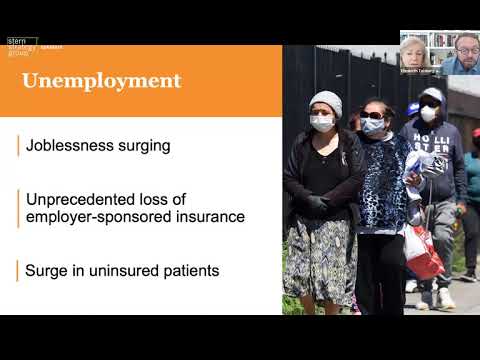Videos
Learn More About Elizabeth Teisberg
A leading figure in the value-based health care strategy movement, Elizabeth Teisberg is Full Professor at the Dell Medical School at the University of Texas at Austin and executive director of the Value Institute for Health and Care. Professor Teisberg is an integral part of the faculty and leadership team at the medical school, the first in decades to be built from the ground-up at a top-tier research university and the only one with a core emphasis on value-based strategy. Here she will focus on strategy, business model creation, person-centered results measurement and design of full cycle, integrated care services.
Professor Teisberg, who is also a senior institute associate at Harvard’s Institute for Strategy and Competitiveness, centers her work on high-value care delivery and implementation of value-based strategy in health care by providers, employers, health plans, pharmaceutical and device companies, patient advocacy organizations, and policy makers. With her deep background in strategy and innovation, and with special attention to the health care sector, she collaborates closely with Michael Porter, renowned authority on competitive strategy. Together they co-authored “Redefining Health Care: Creating Value-Based Competition on Results” (Harvard Business Review Press, 2006), which received the American College of Healthcare Executives’ 2007 James A. Hamilton book of the year award, as well as five other articles on health care and the Harvard Business Review Special Report, “Fixing Competition in U.S. Health Care.”
One of her other Harvard Business Review articles, “Four Ways to Reinvent Service Delivery” (2012), outlines a framework for designing service innovation solutions and discovering new efficiencies to create value. Professor Teisberg’s forthcoming book, “Capability, Comfort and Calm: Designing Health Care Services for Excellence and Empathy” is co-authored with Scott Wallace, who also recently joined the Dell Medical School faculty. Other noted works have appeared in professional publications such as Management Science, Research-Technology Management and the Journal of the American Medical Association. She is also the co-author of “The Portable MBA” (Wiley, 2002), published in five languages.
An international speaker and advisor, Professor Teisberg’s earlier projects have analyzed strategy in medical device and biotech companies, real options, research and development decisions, medical innovation, and strategic response to uncertainty. She received the Wachovia Award for research excellence in 2006 and was honored by the University of Virginia in 2004 with its Frederick S. Morton Leadership Award.
Professor Teisberg came to the Dell Medical School from the faculty at Dartmouth College’s Geisel School of Medicine and the Dartmouth Center for Health Care Delivery Science. She was formerly a professor at the Darden School of Business at the University of Virginia and at the Harvard Business School. She earned a M.S. and a Ph.D. in engineering-economic systems from the Stanford University School of Engineering. She also holds a M. Eng. in systems science from the University of Virginia and an A.B. degree, summa cum laude, in political science and mathematics from Washington University in St. Louis. She is a member of Phi Beta Kappa.
Elizabeth Teisberg is available to advise your organization via virtual and in-person consulting meetings, interactive workshops and customized keynotes through the exclusive representation of Stern Speakers & Advisors, a division of Stern Strategy Group®.
Four Ways to Reinvent Service Delivery
Services account for more than 80 percent of the U.S. GDP and more than 80 percent of the U.S. labor force works in service industries. Despite the sector’s dominance, innovations that radically redefine service delivery are relatively rare. Elizabeth Teisberg – who spent four years tracking innovations in health care – explores an emerging service model designed to help organizations discover new efficiencies, solve problems and innovate to create value for them and their customers. Giving managers a systematic way to question basic assumptions about how a service is defined and delivered, she empowers them to overcome the “that’s not how we do it” mentality, and enables their organizations to achieve dramatically better results.
What New Health Care Reform Means for Your Business
The issues facing us in health care today are as urgent as they are complex. Escalating costs, inconsistent quality, uneven access, and devastating pandemics are all pressing problems that elude easy answers. A key underlying cause of these challenges lies in the disjointed structure of the U.S. health care system – an industry that places employers in the middle of health benefits decisions and payments, insulates consumers from the consequences of their lifestyle and treatment choices, and limits true competition among the suppliers of health care products and services. Just about everyone agrees that we need to reform health care, but few agree on how to do it. Elizabeth Teisberg explores the implications and impact of value-based health care reform – a system that puts the patient at the center – and how businesses are aligning to improve the well-being of their employees without sacrificing their bottom-line.
A Prescription for Health Care Reform: Value-Based Competition
Most U.S. health care reform efforts focus on coverage, ignoring the far bigger long-term driver of success: restructuring the delivery system to focus on value. Elizabeth Teisberg – along with competitive strategist Michael Porter, co-author of their landmark book “Redefining Health Care” (HBR Press, 2006) – argues that competition currently takes place at the wrong level (among health plans, networks and hospitals) rather than where it matters most (in diagnosis, treatment and prevention of specific health conditions). Drawing from decades of research and real-world case examples, Teisberg discusses specific recommendations for all players – hospitals, doctors, health plans, employers and policy makers – as the U.S. health care system shifts to value-based competition, and delivers the best value to patients and lasting benefits for all.
How to Implement “Redefining Health Care” Successfully
Since the publication of “Redefining Health Care,” (HBR Press, 2006), there continues to be strong interest in how to actually implement the principles of value-based health care delivery in practice. From large multi-hospital providers, to small group practices, health plans and employers, many organizations are already transforming their models of care – and are succeeding. Elizabeth Teisberg presents the fundamental principles of value-based health care delivery and closely examines the organizations putting those principles into practice – providing a rich understanding of how to improve patient outcomes without raising costs.

Creating a High-Value Delivery System for Health Care
(Seminars in Thoracic and Cardiovascular Surgery, March 2009)

Redefining Health Care: Creating Value-Based Competition on Results
(Harvard Business Review Press, May 2006)
“Your presentation stimulated much conversation and thought. We so appreciate you sharing your experience and expertise. No one in the room will ever look at health care the same way after learning what truly constitutes value.”
“You gave an amazing talk, I only regret we couldn’t have more time to listen to you! Your insight into diagnosing our health system is pointed, unique and extraordinarily true. I will definitely be looking into your book and articles so much more in the future! Thank you!”
“I swear I could feel my brain bubbling after hearing her speak. I think I’m going to get her book, read it, and then I’ll have a thousand more questions.”




































